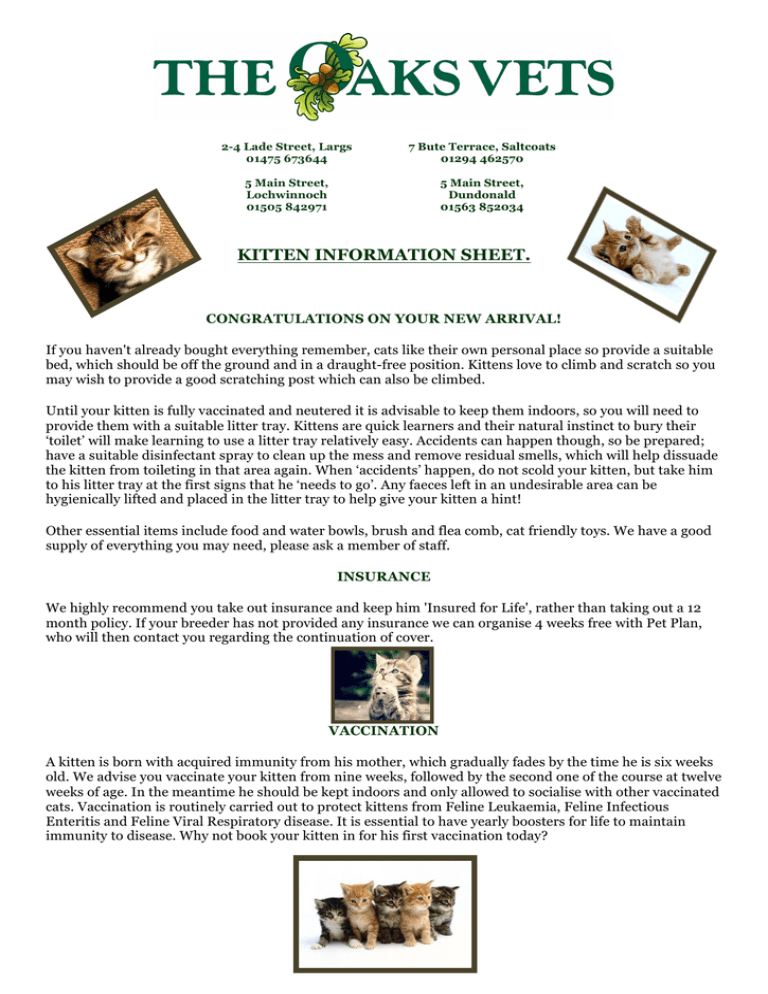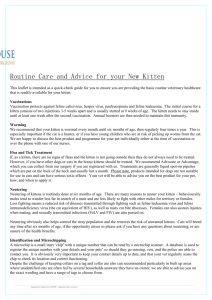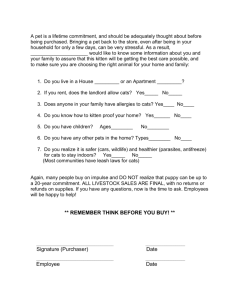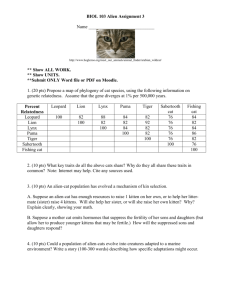kitten information sheet.
advertisement

2-4 Lade Street, Largs 01475 673644 7 Bute Terrace, Saltcoats 01294 462570 5 Main Street, Lochwinnoch 01505 842971 5 Main Street, Dundonald 01563 852034 KITTEN INFORMATION SHEET. CONGRATULATIONS ON YOUR NEW ARRIVAL! If you haven't already bought everything remember, cats like their own personal place so provide a suitable bed, which should be off the ground and in a draught-free position. Kittens love to climb and scratch so you may wish to provide a good scratching post which can also be climbed. Until your kitten is fully vaccinated and neutered it is advisable to keep them indoors, so you will need to provide them with a suitable litter tray. Kittens are quick learners and their natural instinct to bury their ‘toilet’ will make learning to use a litter tray relatively easy. Accidents can happen though, so be prepared; have a suitable disinfectant spray to clean up the mess and remove residual smells, which will help dissuade the kitten from toileting in that area again. When ‘accidents’ happen, do not scold your kitten, but take him to his litter tray at the first signs that he ‘needs to go’. Any faeces left in an undesirable area can be hygienically lifted and placed in the litter tray to help give your kitten a hint! Other essential items include food and water bowls, brush and flea comb, cat friendly toys. We have a good supply of everything you may need, please ask a member of staff. INSURANCE We highly recommend you take out insurance and keep him 'Insured for Life', rather than taking out a 12 month policy. If your breeder has not provided any insurance we can organise 4 weeks free with Pet Plan, who will then contact you regarding the continuation of cover. VACCINATION A kitten is born with acquired immunity from his mother, which gradually fades by the time he is six weeks old. We advise you vaccinate your kitten from nine weeks, followed by the second one of the course at twelve weeks of age. In the meantime he should be kept indoors and only allowed to socialise with other vaccinated cats. Vaccination is routinely carried out to protect kittens from Feline Leukaemia, Feline Infectious Enteritis and Feline Viral Respiratory disease. It is essential to have yearly boosters for life to maintain immunity to disease. Why not book your kitten in for his first vaccination today? PET TRAVEL SCHEME The pet travel scheme allows cats and dogs to enter the UK, provided they have been microchipped, vaccinated against Rabies and treated for parasites. Please ask for more information from your vet if you intend to travel with your cat. WORMING & FLEA TREATMENT The most common intestinal worms that cats get are called roundworms and tapeworms. Many infected cats do not show signs of having worms; however, heavy burdens of worms can cause weight loss, vomiting and diarrhoea, irritation around the anus and failure to thrive. These worms rarely infect people, however when infection occurs there can be serious health implications (e.g. roundworms), so it is important to control infection in our cats. You can worm your cat in various ways; by oral tablet, powders added to their food or by using a spot-on treatment. Fleas are a year-round problem and can cause huge problems. Once a flea has entered your home, you could very quickly have an infestation on your hands as they breed very quickly and lay hundreds of eggs! If your cat is particularly sensitive to the flea bites, he may suffer from Flea Allergy Dermatitis (FAD) which is a painful and irritating condition. Using a good quality flea treatment will prevent your cat suffering from this and protect him from other parasites like ticks and lice. FEEDING We recommend you feed a good quality, complete dry food. Eating dried food will also help clean your kittens’ teeth. We can recommend and supply the best food choice for kitten, please ask for advice. DENTAL CARE As well as feeding a dried food, you can also brush your kittens’ teeth with special cat toothpaste and a small toothbrush. If you invest in their teeth now it could save you a fortune later on in his life. YOUR CHECK LIST • Your kitten should be vaccinated at 9 weeks & 12 weeks of age. • Worm your kitten every 2 weeks till he's 3 months old then monthly till he's 6 months old. From 6 months your cat should be wormed every 3 months. • Get your kitten 'Insured for Life'. • Don’t let your kitten have kittens! Your kitten can be neutered from 4 months of age. Unless you are intending to breed from your cat, it is highly advisable to spay or castrate to prevent unwanted litters, cat fights between males and a male cat chorus outside your window in the early hours of the morning when your female cat is in season!




